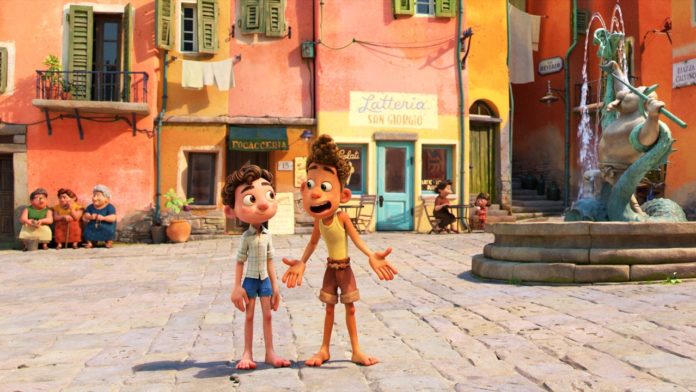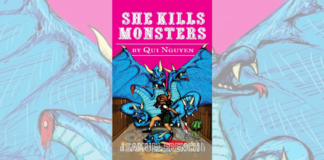
In a dazzling Italy some decades ago, two young men meet and experience a sweeping, happy-sad summer of self-realization together. That may sound roughly like the plot of Luca Gaudagnino’s 2017 film Call Me By Your Name, but it is also the story of the perhaps coincidentally named Luca, the latest bittersweet animated film from Disney and Pixar (on Disney+ June 18).
The film is about two kids, Luca (Jacob Tremblay) and Alberto (Jack Dylan Grazer), who spend most of their time as gilled and finned creatures living under the sparklingly wine-dark Ligurian Sea. If they make their way onto land, they magically transform—in appearance, at least—into humans, free to interact with the landlubbers of a small fishing town populated with whimsical characters. Luca and Alberto share an intense, defining, and world-cracking-open bond, but must hide who they really are in the presence of judgmental, fearful others.
That outline holds an obvious potential for queer allegory, and indeed many Pixar fans tracking the film’s development quickly labeled Luca as the studio’s “gay movie”—a coming-out story to be placed on Pixar’s mantle alongside its meditations on grief, artistic expression, loneliness, Ayn Rand-ian objectivism, and parenting. Finally, Disney might actually venture into queer storytelling, a vast landscape of human experience that the studio has only meekly (and smugly) gestured toward in recent years.
Of course, all of that would have to be done on kid-movie terms. Thus the sea monster metaphor, tempered and universalized by Pixar’s usual cutesy, cozy trappings. Having seen Luca—directed by Enrico Casarosa and written by Jesse Andrews and Mike Jones—I think the film will probably half satisfy those excited theorists.
The film is lovely and funny, but it operates on a more minor key than some of Pixar’s true classics. It’s mostly the story of a kids’ triathlon competition held in the quaint village of Portorosso, where Luca and Alberto meet a local girl, Giulia, who is also a black-sheep outlier in her staid, conservative town. The goofiness of Luca and Alberto learning to ride bicycles and eat pasta, while trying to avoid water, is the film’s central concern; any deeper probing of what the film is actually about will have to be done by each individual audience member.
There is enough there to graft a queer reading onto—Luca’s doting parents (voiced by Maya Rudolph and Jim Gaffigan) are scared about how Luca’s identity may be greeted by those who don’t understand him, for instance—but the film could just as easily be seen as an allegory for other sorts of difference. The boys’ washing ashore brings to mind the recent immigration and refugee crisis gripping Europe, as people fleeing war-torn lands are met with hostility and shunned by governments as they simply try to survive. Or the film could more broadly just be about a particular time in early adolescence, when kids tend to leapfrog over one another on their way to young adulthood, sometimes leaving each other behind as they grow into their true selves and race down newly open paths.
Casarosa has explicitly said that the film is not a queer story, that it is all “platonic” and determinedly “pre-pubescent.” That suggests a limited understanding of gay growing up, particularly of when our feelings of affection and special closeness and difference can first develop. It would seem, as it so often does, that in Casarosa’s (and perhaps Disney’s) view, queerness must specifically involve sex to be queerness at all. And, of course, Pixar is never going to make a movie, ostensibly for kids, that even hints at sex.
Still, Luca is art offered up to be interpreted by myriad disparate viewers. Many of them may well see something specific in the arc of Luca and Alberto’s friendship, and in how they relate to the world around them. This at least nudges Disney closer to exploring the full breadth of reality. And Luca does, despite its vagueness, successfully pull off some of the usual Pixar tricks, provoking warm tears and weary sighs as one considers the familiar trajectories of life. The studio is masterful at teasing out those “It’s true, it really is like that” moments of manageably scaled profundity, all wrapped up in gleaming packages.
Aside from who it may or may not represent, the film is a nice introduction to summer in its intoxicating wash of blues and greens and oranges, the way it conjures up the heady momentum of youth, the thrilling rush of life’s pages turning. (To the likely dread of many worried parents the world over, the film is also a very effective advertisement for Vespa scooters. It should come as no surprise, of course, that Disney is ever adept at selling things.) Luca does well in that regard, though will perhaps be more memorable for what it might have been than for what it actually is.








